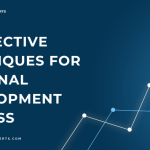Table of Contents
- Introduction
- 1. Embrace a Growth Mindset
- 2. Shift from Fear of Failure to Learning Opportunities
- 3. Replace Negative Self-Talk with Positive Affirmations
- 4. View Challenges as Stepping Stones
- 5. Cultivate a Habit of Gratitude
- 6. Focus on the Process, Not Just the Outcome
- 7. Surround Yourself with Positive Influences
- 8. Embrace Change as a Constant
- 9. Prioritize Lifelong Learning
- 10. Practice Self-Compassion
- Conclusion
- FAQs
Introduction
Personal growth is an exciting journey, but it can also be challenging. The key to navigating this journey often lies in your mindset. Your beliefs and attitudes shape how you perceive challenges, setbacks, and successes. In this article, we’ll explore ten mindset shifts that can fuel your personal growth journey, helping you to thrive and evolve in a positive direction.
1. Embrace a Growth Mindset
A growth mindset, a concept popularized by psychologist Carol Dweck, is the belief that your abilities and intelligence can be developed with effort, learning, and persistence. This mindset shift encourages you to view challenges as opportunities for growth rather than as threats to your self-worth.
“A growth mindset sees challenges as opportunities to learn and improve.”
Benefits of a Growth Mindset:
- Increased resilience when faced with setbacks.
- Greater motivation to learn and improve.
- Enhanced creativity and problem-solving skills.
For more insights into how positive thinking can transform your mindset, check out 10 Ways Positive Thinking Transforms Your Daily Life.
2. Shift from Fear of Failure to Learning Opportunities
Many people let the fear of failure hold them back from pursuing their goals. By reframing failure as a learning opportunity, you can reduce anxiety and open yourself up to new possibilities. Every setback is a chance to learn and grow.
“Failure is not the opposite of success; it’s part of success.”
How to Implement This Shift:
- Reflect on past failures and identify what you learned.
- Set small, achievable goals to build confidence.
- Celebrate your efforts, not just your successes.
Also, consider exploring 10 Powerful Techniques to Cultivate Positive Mindset for more strategies on overcoming fear.
3. Replace Negative Self-Talk with Positive Affirmations
The way we speak to ourselves can significantly impact our mindset. Negative self-talk can hinder personal growth, while positive affirmations can boost self-esteem and motivation.
“Your words have power. Speak kindly to yourself.”
Tips for Practicing Positive Affirmations:
- Write down affirmations that resonate with you.
- Speak them aloud daily, especially in the morning.
- Use visualization techniques to reinforce these affirmations.
Example Affirmations:
| Negative Self-Talk | Positive Affirmation |
|---|---|
| “I can’t do this.” | “I am capable of overcoming challenges.” |
| “I always fail.” | “Every failure is a lesson that helps me grow.” |
For more about affirmations, check out 10 Powerful Affirmations to Boost Mental Health Today.
4. View Challenges as Stepping Stones
Instead of seeing challenges as roadblocks, try to view them as stepping stones toward your goals. This perspective encourages a proactive approach to problem-solving and resilience.
“Challenges are what make life interesting; overcoming them is what makes life meaningful.”
Strategies to Embrace Challenges:
- Break challenges into smaller, manageable steps.
- Seek support from mentors or peers when facing difficulties.
- Keep a journal to track your progress and reflect on your growth.
5. Cultivate a Habit of Gratitude
Practicing gratitude can shift your focus from what you lack to what you have, fostering a more positive mindset. Research shows that gratitude can improve mental health, increase resilience, and enhance overall well-being.
“Gratitude turns what we have into enough.”
Ways to Cultivate Gratitude:
- Keep a gratitude journal where you write down three things you’re grateful for each day.
- Share your gratitude with others through notes or conversations.
- Use gratitude prompts to inspire deeper reflection.
For tips on gratitude practices, see 10 Simple Gratitude Practices to Boost Positive Thinking.
6. Focus on the Process, Not Just the Outcome
While it’s essential to have goals, focusing solely on the outcome can lead to disappointment. Emphasizing the process encourages you to appreciate the journey and learn from each step.
“Success is a journey, not a destination.”
How to Shift Your Focus:
- Set process-oriented goals (e.g., “I will practice for 30 minutes each day”).
- Reflect on your experiences regularly, noting what you learned.
- Celebrate small wins along the way to reinforce progress.
7. Surround Yourself with Positive Influences
The people you spend time with can profoundly impact your mindset. Surrounding yourself with positive, supportive individuals can inspire you to grow and reach your potential.
“You are the average of the five people you spend the most time with.”
Tips for Building a Positive Support Network:
- Join groups or communities that share your interests and goals.
- Seek out mentors who can provide guidance and encouragement.
- Limit time spent with negative influences that drain your energy.
8. Embrace Change as a Constant
Change is inevitable, and learning to embrace it can lead to personal growth. Viewing change as a constant can help you adapt more easily and be open to new experiences.
“Change is the only constant in life.”
Steps to Embrace Change:
- Practice mindfulness to stay present and reduce anxiety about the future.
- Reflect on past changes that led to growth and new opportunities.
- Keep an open mind when faced with unexpected changes.
For more on embracing change and resilience, check out 10 Ways Positive Thinking Boosts Resilience in Tough Times.
9. Prioritize Lifelong Learning
A commitment to lifelong learning fosters curiosity and keeps your mind sharp. Whether through formal education or self-directed learning, embracing new knowledge can fuel your personal growth.
“Education is the most powerful weapon which you can use to change the world.”
Ways to Incorporate Lifelong Learning:
- Take online courses on topics that interest you (consider platforms like Coursera or edX).
- Read books, articles, or blogs that challenge your thinking.
- Engage in discussions with others to gain new perspectives.
Explore Top 10 Must-Read Books on Positive Thinking 2024 for more resources on personal development.
10. Practice Self-Compassion
Self-compassion involves treating yourself with kindness during difficult times. It encourages you to acknowledge your struggles without harsh judgment, which is vital for personal growth.
“Be kind to yourself. You’re doing the best you can.”
Techniques to Foster Self-Compassion:
- Practice mindfulness to become aware of your thoughts and feelings without judgment.
- Write a letter to yourself during tough times, offering words of encouragement.
- Seek support from a therapist or counselor if needed.
For additional strategies on improving emotional well-being, check out 10 Effective Emotional Regulation Techniques for Daily Life.
Conclusion
Mindset is a powerful tool in your personal growth journey. By implementing these ten mindset shifts, you can foster resilience, embrace challenges, and ignite your path toward achieving your goals. Remember, personal growth is a continuous journey, and every step counts.
FAQs
Q: How can I start shifting my mindset?
A: Start by identifying one area of your mindset that you’d like to change. Focus on small, actionable steps, and practice regularly.
Q: Is it possible to change my mindset overnight?
A: Changing your mindset takes time and practice. Be patient with yourself and commit to ongoing self-reflection.





